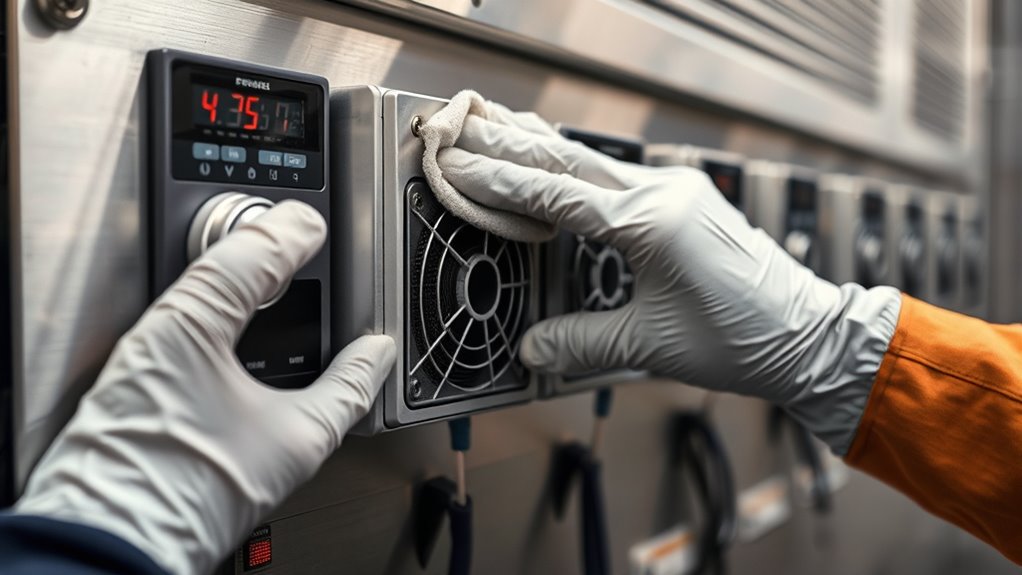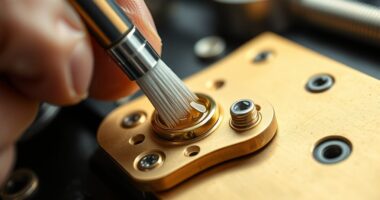To keep your heaters, fans, and sensors running smoothly, perform regular cleaning, calibration, and inspections. Check sensors often to prevent inaccuracies caused by dust or debris, and calibrate devices after electrical surges or maintenance. Manage power usage with efficient settings and monitor for signs of wear or unusual energy use. Regular upkeep ensures safety, efficiency, and longer equipment life. Stay tuned to discover crucial tips that will help you maintain these essential components effectively.
Key Takeaways
- Regularly clean and inspect heaters, fans, and sensors to prevent dust buildup and ensure accurate operation.
- Perform routine calibration checks, especially after electrical disturbances or equipment upgrades.
- Monitor power consumption for irregularities indicating mechanical issues or inefficiencies.
- Tighten loose connections and replace damaged components during scheduled maintenance.
- Keep detailed records of maintenance, calibration, and performance to facilitate troubleshooting and upgrades.

Proper equipment care is fundamental to guarantee your tools and machinery perform efficiently and last longer. When it comes to managing heaters, fans, and sensors, paying attention to details like temperature calibration and power consumption management makes a significant difference. Maintaining accurate temperature calibration ensures your heating devices operate within the desired parameters, preventing overheating or underperformance that could damage components or waste energy. Regularly checking and adjusting temperature sensors keeps your equipment functioning precisely, which is critical in applications where accuracy impacts safety and quality.
Power consumption management is another essential aspect of proper equipment maintenance. Efficient operation not only reduces your energy bills but also minimizes wear and tear on your machinery. By monitoring power usage, you can identify irregularities or inefficiencies early, preventing costly breakdowns. For example, if a fan is consuming more power than usual, it might indicate a mechanical issue or the need for cleaning or lubrication. Correcting these issues promptly helps your equipment run smoothly and reduces unnecessary energy drain.
Keeping your heaters, fans, and sensors clean is indispensable. Dust and debris can interfere with temperature sensors, causing inaccurate readings and improper operation. Regular cleaning ensures that calibration remains accurate and the equipment responds correctly to control signals. For sensors, maintaining proper contact and shielding from environmental interference are essential for precise measurements. When sensors are compromised, it affects temperature regulation, leading to energy waste or damage, so routine inspection and cleaning are worth your effort.
Additionally, implementing a consistent maintenance schedule helps you stay ahead of potential problems. Periodic calibration checks should be part of your routine, especially after power surges or equipment upgrades. This ensures your temperature calibration stays accurate and your equipment’s performance remains reliable. During maintenance, inspect electrical connections and wiring for signs of wear or corrosion. Tighten loose connections and replace damaged components to prevent short circuits or malfunctions that can escalate into costly repairs.
Furthermore, adopting energy-efficient settings and devices can optimize power consumption management. Use programmable thermostats or smart controllers to fine-tune heater and fan operation based on real-time needs. This approach minimizes unnecessary energy use and prolongs the lifespan of your equipment. Keep detailed records of calibration dates, power consumption patterns, and maintenance activities to track improvements and plan future upgrades effectively.
Frequently Asked Questions
How Often Should I Calibrate My Sensors for Optimal Accuracy?
When it comes to sensor accuracy, calibration frequency depends on how often you use them and the environment they operate in. Generally, you should calibrate your sensors at least once every six months to guarantee proper performance. If you notice inconsistent readings or environmental changes, increase calibration frequency. Regular calibration helps maintain precision, reduces errors, and prolongs sensor lifespan, ensuring your equipment runs smoothly and accurately.
What Are Signs That My Heater or Fan Needs Urgent Repair?
You should watch for warning signs like strange noises, inconsistent heating or cooling, and excessive energy use, as these indicate your heater or fan might need urgent repair. When you notice unusual smells or frequent cycling, it’s a clear sign of repair urgency. Addressing these issues promptly prevents further damage, maintains efficiency, and guarantees safety. Ignoring warning signs can lead to costly repairs or system failure, so act quickly when problems arise.
Can I Use Regular Cleaning Products on Electronic Sensors?
You shouldn’t use regular cleaning products on electronic sensors because they can damage delicate components. For proper sensor cleaning, use a soft cloth or a gentle electronic maintenance solution specifically designed for sensors. Avoid harsh chemicals or abrasives. Regular sensor cleaning helps guarantee accurate readings and prolongs your equipment’s life. Always follow the manufacturer’s instructions for sensor maintenance to prevent any damage and assure peak performance.
How Do Environmental Conditions Affect Equipment Lifespan?
Think of your equipment as delicate plants that thrive in the right environment. High humidity can cause corrosion, while dust acts like a blanket, clogging sensors and fans. By practicing humidity control and dust prevention, you extend their lifespan and keep them humming smoothly. Ignoring these factors accelerates wear and tear, turning your reliable tools into fragile relics. Proper care guarantees your equipment stays resilient and efficient over time.
Are There Safety Protocols for Handling Faulty Heating or Cooling Units?
When handling faulty heating or cooling units, you should follow strict safety procedures and emergency protocols. Always turn off the power before inspection, wear protective gear, and avoid direct contact with electrical components. If you detect leaks, strange noises, or sparks, evacuate the area and notify maintenance immediately. Staying alert to safety guidelines helps prevent accidents and guarantees safe, effective responses to equipment malfunctions.
Conclusion
Just as a steady heartbeat keeps life flowing, caring for your heaters, fans, and sensors keeps your environment thriving. Your attention is the steady hand guiding their rhythm, ensuring they serve you well. When you maintain them with patience and care, they become the silent guardians of comfort and efficiency. Remember, in every switch and sensor, there’s a promise — a rhythm of reliability that sustains your space, like a heartbeat that never falters.









